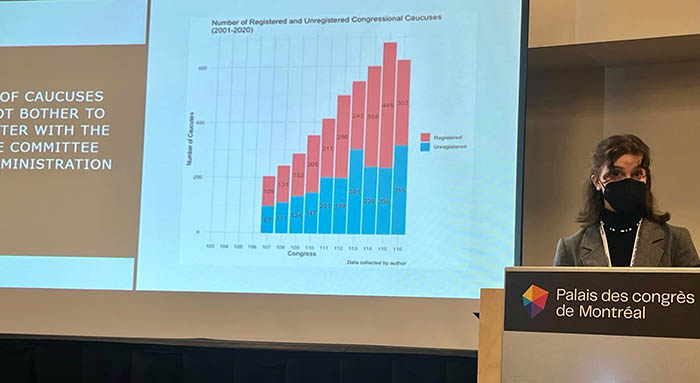In This Story

Molly Izer’s political curiosity knows no bounds. As a second-year student in the George Mason University Honors College, she has already explored a range of political advocacy spheres. From her high school origins in grassroots organizing in Oregon to her freshman-year congressional internships in Washington, D.C., Izer is now taking the next step with policy research at Mason and beyond.
Merging her interests in policy advocacy and research, the government and international politics major at the Schar School of Policy and Government spent this past summer as a legislative affairs intern for the Executive Office’s Council on Environmental Quality and an Undergraduate Research Scholar with Mason’s Office of Student Scholarships, Creative Activities, and Research (OSCAR). In both roles, she developed an understanding of the internal dynamics of and interactions between Congress and the White House, areas she was encouraged to explore through her first-year research course, HNRS 110: Principles of Research and Inquiry.
“In my [HNRS 110] class we were taught to not only look for differences that we could see on the outside, but also look at why they happen that way,” Izer said.
Practicing collecting, analyzing, and synthesizing information through HNRS 110 prepared Izer for her summer OSCAR project. Mentored by Schar School associate professor Jennifer N. Victor, she investigated the informal dynamics that occur within the House of Representatives through congressional caucuses, seeking to understand how the interactions influence various types of legislative behaviors.
Her work culminated in presenting her findings before scholars at the 2022 American Political Science Association’s (APSA) annual meeting in Montreal in September, a rare opportunity for an undergraduate to present research at an international conference. APSA is the leading organization for the study of political science. The meeting convened in Montreal, Quebec, this year.
“The conference was a fantastic experience,” Izer said. “I felt I learned a lot, pertaining to both political science and research more generally. Everyone I met was very kind and willing to teach, and all encouraged me to continue to incorporate research in to my academic path…We received valuable feedback that we plan to incorporate in to the paper moving forward.”
Not a moment in Montreal was wasted.
“I had the opportunity to shadow Dr. Victor as she chaired a panel, which was very informative and a great experience,” she said.
Sharing her work widely beyond the Mason community is especially important. On research communication and applicability outside of academia, Izer believes it is important “to [transform research] into something that other people can gain from and something that other people can see and learn from.”
She attributes her preparation for this task to her training in the Honors College. “The Honors College in particular teaches how to not just learn but to be teachers, and producing research gives us an avenue to be a teacher,” she said.
She encourages Honors College students looking to further their research or get involved in political advocacy to put themselves out there and ask for help. Her experiences prove to her that reaching out to the professor or applying for the position that interests you can lead to impactful experiences.
—Additional reporting by Buzz McClain
